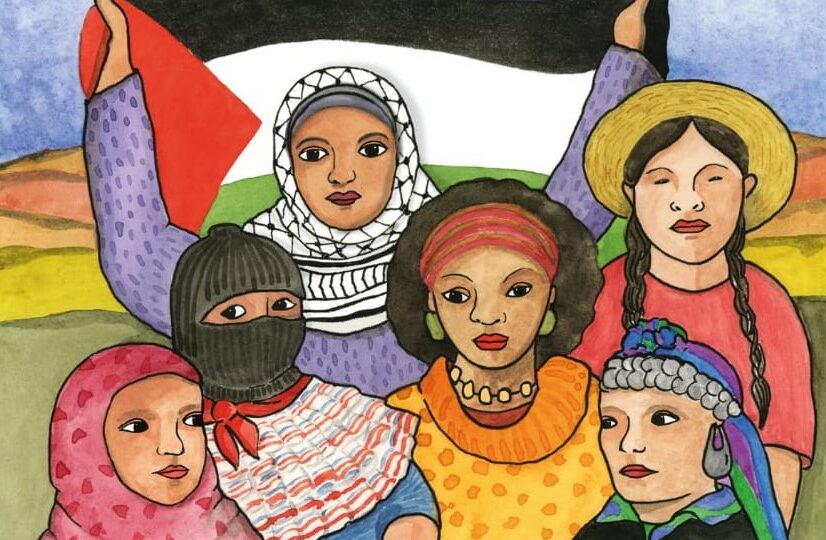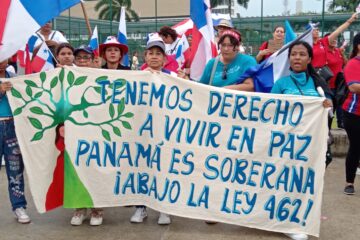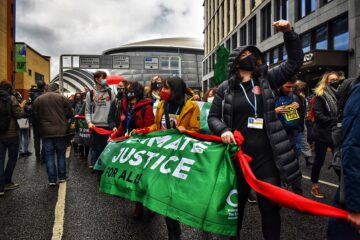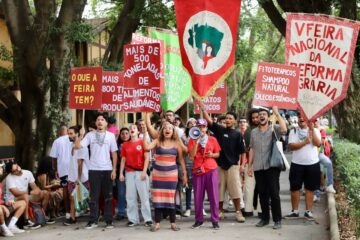Listening to the voices of Palestinian women is fundamental to understand the historical and current forms of genocide against the Palestinian people. In addition to exposing the more than 30,000 Palestinians killed by Israel since October 2023—of which nearly 25,000 were women and children—, Palestinian women have addressed how genocide is not simply about numbers, but it is rather an orchestrated policy. Genocide is an attack on the bases that sustain life: land, bodies, the everyday work of production and reproduction of Palestinian life.
Palestinian women are waging the struggle—they resist every day and face the brutality of imperialism against their bodies and territories. They call us to make the struggle for Free Palestine massive, from the river to the sea. As part of the 24 Hours of Feminist Solidarity, an action called by the World March of Women this March 30th, Palestinian Land Day, we echo Palestinian voices shared on March 21-22 during seminars organized by women with La Via Campesina and the World March of Women.
Palestinian Land
“This Land Day, everyone—from north, south, east, and west—is connected to defend this land, which has been and always will be Palestine. We are the last women who will live and endure the occupation that has been happening for more than 75 years of genocide.” This is how Maryam Abu Daqqa positions the Palestine mobilization on this Land Day.
The connection between land and women is very strong. We, women, are being displaced from our lands, which feed our families, our children.
Maryam Abu Daqqa
A reflection by farmer Samah Abu Nimah brings us even closer to the reality of Palestinian women in their relationship with their land. “The occupation imposed restrictions on resources, demanding imported products that became very expensive. It’s worth noting that Palestinian women constitute 78% of the people responsible for agricultural work. Women participate in production processes such as planting, harvesting, and marketing. They also participate in raising livestock, and they take care of them, feed them until they can extract milk, for example. They produce dairy products and animal derivatives.”
Land Grabbing, a Violent Occupation Method
Nariman Bajawwi, who lives in Jenin, recalls that, “since 1948, when they started to confiscate our land and bring settlers to settle in the territory, the Zionists argue that this is a land without a people for a people without a land.” This argument is proven to be a fallacy by the land titles registered with the name of Palestinian women, dating back to 1858, published by Capire on Palestinian Land Day 2022.
Also in a piece published in 2022, our sister Khitam Saafin, who was in prison at the time, was unequivocal about the connection between Zionism and land grabbing. “In 1948, the Zionist movement, with all the support from colonial powers, destroyed more than 500 Palestinian villages and displaced its residents. It was responsible for the forced displacement of the majority of Palestinians from their towns and their replacement with Zionist settlers. This is how the establishment of the State of Israel was announced in these lands.”
She also addressed the continuity of this displacement process: “In 1967, waging a new colonial war, Israel managed to occupy other Arabic lands: the Sinai Peninsula, the Golan Heights, and parts of Lebanese lands. And it is still there, to this day, conducting operations to control lands in the West Bank, establishing settlements through military law. This is part of a number of consecutive plans, being the latest one the annexation plan announced in 2020 by the former prime minister of Israel, Benjamin Netanyahu, which aims to annex 33 percent of the West Bank to Israel.”
Keeping the settlements that already exist and building new ones is a colonizing practice adopted by Israel, as Nariman explains. Also, “the Apartheid wall, which spans across the West Bank, has led to confiscation and appropriation of many Palestinian territories. Many villages were separated by the wall. Israelis are managing and controlling these villages. Palestinians can’t get in or out without Israeli permission. Farmers cannot farm their lands, especially their olive trees, because they don’t have access to them.” “The olive season is considered a main pillar in the life of Palestinian people. Some families work throughout the year to take care of the land and olive trees, to harvest and press the fruits, produce oil and sell it to obtain a financial return for themselves and their daily life,” Samah explains.
Nariman looks into the impact of military attacks on Palestinian production: “The occupation has destroyed all infrastructure and services in Gaza. There is nothing left standing. This crisis will affect trade, farmers, access to fresh and saltwater.” Samah Abu Niman also reports the increasing obstacles following the escalation of Israeli attacks: “They became more than just obstacles, but complete prohibition from anything related to water, land, or even raising livestock. Many cases of settler attacks on farmers or peasants on their lands were recorded. The largest share of the affected were women, on whom most of the injuries are inflicted. Also, more attacks on women were recorded in many Palestinian villages, cities, and towns.”
Criminalization, Imprisonment, and Human Rights Violations
The young Palestinian Ruba Assi was arrested twice: when she was a university student and in October 2023. She was only released again in February 2024. “The first time, there was a campaign against students across the country. I was arrested with no charges, it was purely an administrative thing. After October 7th, everything was different from the first time,” she said.
Today prison is a much larger grave. It’s a cemetery. There is no humanity, no mercy. Right now, there are so many people in prison—the ones we know about, and also many we were not able to identify.
Ruba Assi
Women arrested in Gaza are not allowed to contact anyone, are not entitled to talk to their families or hear news about the genocide. “They did not know if their children were dead. They were allowed fewer hours to receive visitors, less time in the yard. They were only allowed to leave their cells one day, to take a shower, to be in the yard. There was an extreme shortage of food, really poor quality food. There is no water in the prison. We had to drink water from rusty taps. All that makes people in prison die faster,” Ruba shared.
Since the beginning of the aggression and the genocide, the occupation targets women.
Raya Raduan
The activist Raya Raduan shares how women are treated in military camps: “If they refuse to be inspected or checked out, they might be beaten and the military deprive them of any rights, they threaten them of rape harassment, insults and, of course, if these women wear hijabs, the police take them off. Of course, there is no privacy.”
Sustaining Life Every Day Amid the Genocide
The Israeli genocidal project is pervasive: massive killings orchestrated with the destruction of infrastructure, culture, and health care conditions, food shortage, and water contamination. An entire people is subjected to the struggle for survival and to collective, violent mourning amid the rubble. Sammer Abu Safiya, who lives in Gaza, shares her reflection: “The war has a negative effect on all Palestinians and especially the women. Around 63 women get killed every day and 37 women get injured every day. A lot of children lose their mothers and the life they were used to. According to the latest statistics, there are around 4,700 children orphaned. More than 50% of the women who were displaced can’t get pregnant. Many women gave birth during the war.”
“Women also find it difficult to have access to hygiene products and to food to prevent starvation. The situation is quite hard as nobody can have access to their own land and there is no production line. Everything we get is through humanitarian assistance,” Sammer added.
Nobody faced mercy. There was nothing that the occupation did that showed mercy. There are a lot of pregnant women and they had to breastfeed their children or hold their toddlers, because the child could not even turn around during 6 hours, because any random movement could lead to the killing of the entire family.
Sammer Abu Safiya
The member of the Union of Palestinian Women’s Committees (UPWC) Raya Raduan also reports the situation of pregnant women: “The situation in the hospitals is terrible. Women give birth in shelters. There are no appropriate health care conditions. Many of these women have lost their babies. In the absence of a good health care system, some women resorted to extracting their ovaries, so they couldn’t give birth.”
She talks about the pain of continuing to struggle despite the violence and loss of so many dear people. “One of our colleagues, her son died of starvation. When I talk about Palestinian women, I don’t know what to say. But they have been on the frontline for 75 years now. Since the beginning of the aggression, they face violence in the streets and in their homes.”
In charge of taking care of their families and communities, women face the hardships of forced displacement, always aiming to sustain life: “Women need to adapt, to cook for the children, to live their lives, but they cannot find clean water. They cannot find bathrooms. They cannot find the gas they need to cook. They cannot take a shower,” Sammer says.
Defending the Palestinian People Is a Global Emergency
“Women cannot sleep or rest. We are being massacred as a people,” Maryam said, adding women’s ability to struggle and have resilience, which must be seen worldwide: “Ours is a continuous struggle until we get our dignity back. We will use the forms and methods that seem convenient to us to demand our rights as human beings. In many parts of the world, we are considered terrorists, but we are fighting against imperialism, which has been imposed since the Balfour Treaty. Calls for a ceasefire are too tame. It is a shame that, in the 21st century, we have these new forms of racism and colonialism.” A few months ago, Maryam was persecuted in France and was denied a visa. “I was stalked, beaten, dragged, forced out, deported. This is the oh-so-democratic France, as some say,” she said. At the time, we published a report on the criminalization endured by Maryam, along with parts of a text she authored, “The Return Journey.”
Raya believes the logic of silencing and disinformation that rules the hegemonic media must change. “The one thing that we can discuss about women here is the double standards of the International Community. It is how the world rules on and panics because there were claims of rape on the 7th of October, but now the world is not doing anything. Palestinian women are facing death.” Once again, the feminist discourse has been used as an instrument in the Global North to justify imperialism, placing women’s lives in a racism-based hierarchy. Maryam argues that “we need feminism to establish a broad, global front that stands up in face of this situation and denounces it to the world.” Grassroots feminism, more than ever, is firmly positioned on the lines of anti-imperialism, building full solidarity with the struggle of the Palestinian people for sovereignty and self-determination, and for an immediate ceasefire.
Ruba Odeh, of the World March of Women Palestine, argues that this demand must be embraced in the entire world: “We demand the end of the genocide in Gaza and the West Bank to move toward freedom and to achieve a free state, with our own capital.” She adds that “part of the Palestinian struggles for the right to sovereignty in our land is waged by women. The Zionists always aim to minimize the power of Palestinians, trying to control our water resources. But we render the struggle of Palestinian women visible, as well as their firmness and resilience.”




